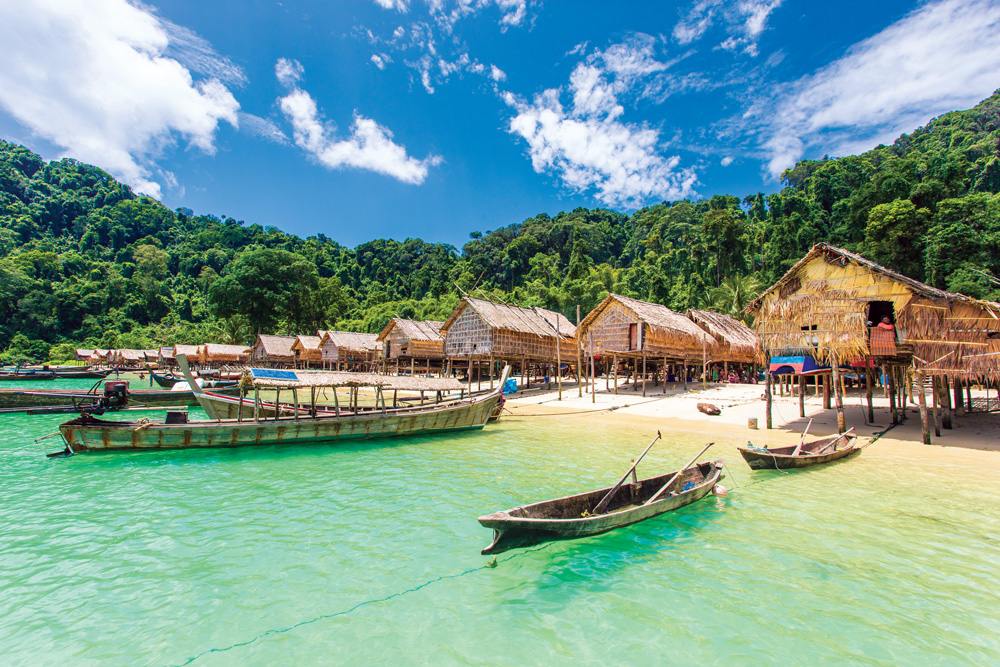 On the continent of Asia, at its
middle southern point lays the country of Thailand. Right off its lush
rainforest coast spread the islands of Surin in the Andaman Sea. Moken people
known as the sea gypsies roam the Andaman Sea among the Surin islands. When
tsunami season comes, they live at the edge of the rainforest by the sea,
watching out for Laboon.
On the continent of Asia, at its
middle southern point lays the country of Thailand. Right off its lush
rainforest coast spread the islands of Surin in the Andaman Sea. Moken people
known as the sea gypsies roam the Andaman Sea among the Surin islands. When
tsunami season comes, they live at the edge of the rainforest by the sea,
watching out for Laboon.
In the azure colors of the Andaman Sea
the Moken children make their first steps, not in walking, but rather in
swimming. They swim before they can walk. They spend so much time in the water,
as a result they can see twice as sharp underwater and can hold their breath
twice as long as other children.
The Moken children don’t know the
meaning of time, therefore they don’t know their age. They don’t know the
meaning of the word ‘want.’ As they travel from place to place by the sea, they
don’t want things to hold them back. Material goods have little meaning for nomadic
people.
The turquoise shades of Andaman Sea
with the white frothing waves crashing against the green rainforest compose the
playground for the Moken children with the colorful coral reefs filling the
background. Their games are about sharpening their skills needed for survival.
The children compete who can swim fastest, dive deepest, throw farthest, and find
the most sea cucumbers and shellfish on a single breath.
One day, as the children played the
games in the sea, they noticed the water getting shallower and shallower. The
sea was receding farther and farther away from them. The hermit crabs made
their way towards the forest. The birds flew to the trees at the higher
elevation, leaving the sea level unusually quiet. Even the waves got flat, not
making any sound. The wind stopped in its track.
The village chief came running towards
the children and from afar pointed towards the land. It was so quiet, the
children could clearly hear him from the distance, “Come back to the land! We
have to move to the higher elevation before the Laboon comes!”
“Laboon!” the children yelled in
terror and started running toward the shore. As they ran, only one image kept
appearing in front of them and only one story kept replaying in their minds.
They spent many evenings by the fire filled with stories told by
the Moken villagers. The most interesting tales were told by the village chief
and his sister. They could entertain for hours. But there was one story in
particular that stuck in their minds the most. It was the one of Laboon.
“Laboon is a sea monster. It is sent by the ancestors to remove
the bad in the world and make a place for a new beginning. He gulps the water
into his mouth, then spits it out with such force it results in many
devastations. Then the world gets reborn after the bad is removed.”
Now, the community of Moken people was
already on the move up the mountain. They raced as quickly as they could. The young
assisted the elders and the little children climbing the narrow paths through
the thick rainforest. As they climbed to higher elevation they saw glimpses of the sea. A moment ago
a flat sea, now became ferocious with high waves and quick speed making its way
to the shore. They could feel the ground rumbling under their feet; the waves
almost reaching them and the speed almost pulling them down. But they hold on
to anything that could that was strongly rooted in the ground, hoping for the
fierce monster to go away soon.
After the waves calmed down, the Mokens
descended down to the shore. The monster wave destroyed all villages in its way.
There were some people floating in the water or clinging onto the rocks and screaming
for help. The Mokens searched for their longtail boats, but only pieces of wood
were floating. They grabbed the larger pieces and swam towards the survivors.
And such is the tail of the sea
gypsies and their legend of Laboon, which saved them from tsunami. While a lot
of people lost their lives, all Mokens, who escaped to the higher elevation,
were saved.
Note: In 2004, off the coast of
Sumatra, a 9.0 magnitude earthquake triggered a tsunami that resulted in nearly
300,000 deaths. A community of 184 Moken people survived the tsunami thanks to
the passed-down folklore of Laboon or ‘seventh wave.’
Source: The Sea Gypsies. Report by Bob Simon on 60 Minutes.
Source: The Sea Gypsies. Report by Bob Simon on 60 Minutes.
Inspiring story. The point is that there are various approaches, even preposterous ideas (according to current science) which are life saving, even.
ReplyDelete